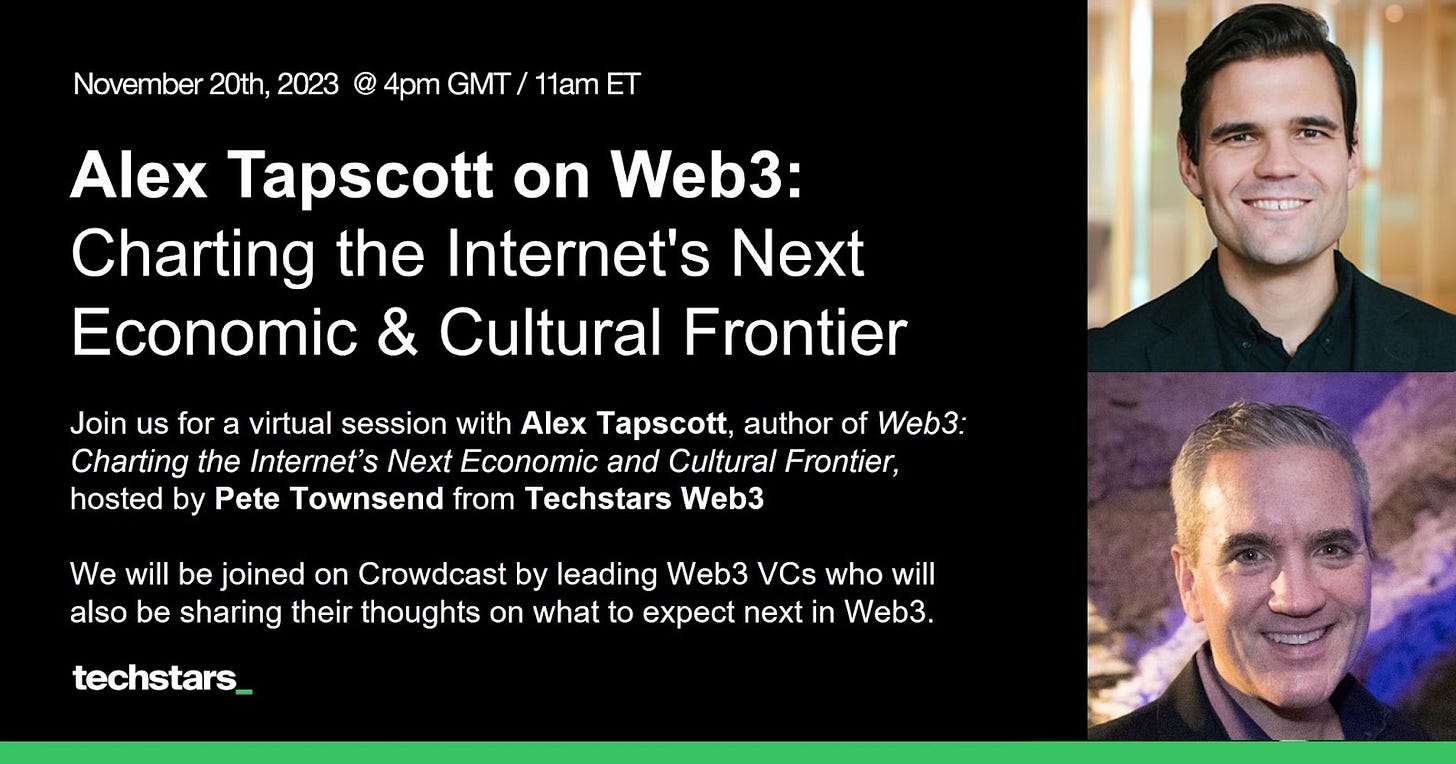Before diving into this week’s newsletter, this is just a quick heads up: if you're building in web3, or you know someone who is, the next class of the Techstars Web3 accelerator takes place in Spring 2024, and applications are open now.
As web3 is global and borderless, so is Techstars Web3. Although most of the accelerator content is delivered virtually, the class does meet up in person for a week at a time at the beginning, middle, and end of the program in different cities around the world. Jump on over to the Techstars Web3 website to learn more and apply.
More Media & Events
Today (20-Nov-23) at 4pm GMT/11am ET, I’m hosting a virtual session with Alex Tapscott, author of Web3: Charting the Internet’s Next Economic and Cultural Frontier (Harper Collins). We'll also be joined by Justin Swart from BITKRAFT Ventures and Sterling Campbell from Blockchain Capital sharing their insights on what to expect next with Web3.
We’ll finish the session with a crowd Q&A, so register here and get your questions ready!
This Week’s Podcast
One of the best parts of running a podcast is the hundreds of hours of content that we end up with, and I get to go through and pick out the best of each conversation. Sometimes, the content is from just one conversation, and the output makes its way to your ears as a full-length interview or as a topical Money Talks segment. Every once in a while, I like to go back through and curate the most insightful things that multiple guests have shared on a specific topic, and we end up with episodes like our Web3 Wishlist that we produced this week.
This one was a bit different, as I also reached out to a few friends in web3 that I had not yet had the opportunity to interview for the podcast, and I jumped right to the end result with this one question:
“What would you like to see web3 founders solve, or if it’s easier, what would you like to see them do more of or less of?”
What we ended up with focuses on user experience, digital identity, decentralized finance, AI, regulatory issues, real-world assets, broader real-world applications and a few personal traits that we’d like to see bubble up to the surface in terms of founders’ modus operandi.
The diverse panel includes John Hallahan from Fireblocks, Arry Yu from the U.S. Blockchain Coalition, Hesus Inoma from i13 Ventures, Niamh O'Connell from CasperLabs, Prashanth Swaminathan from Woodstock Fund, Sean Lee from the Crypto Council for Innovation, Clarisse Hagege from Dfns, and Lou Kerner from the Crypto Oracle Collective.
Here’s a summary of what our experts said:
User Experience - we’d like web3 to be less clunky, but still with bomb-proof security.
Digital Identity - this is a huge opportunity with real-world applications, and no one is getting it right just yet.
Interoperability - our past, present and future is multi-chain, and we need to be able to transfer assets freely and securely across blockchains.
Crossover value - AI with web3, DeFi with real-world assets, consumer apps with blockchain, insurance with DeFi.
Regulation - not all jurisdictions (ahem…Uncle Sam) are at the races and need to get moving
Founder mindset - be the adult in the room, don’t launch a token if you don’t need one, and learn fast from your mistakes.
The Web3 Wishlist
John Hallahan is Director of Business Solutions & Advisory at Fireblocks, whose mission is to enable every business to easily and securely support digital assets and cryptocurrencies. John is also a fantastic mentor for the Techstars Web3 program and one of the Irish blockchain OGs who I've known as long as I've been in this space.
“Fundamentally for me, there are three things at the moment that are stopping widespread adoption. I think the first one is in relation to UX. Anyone's aware if they've used MetaMask or any dApp, the user experience is pretty clunky.
So how do we solve that UX problem? I think we had really good examples of people looking to solve that last year (in Techstars Web3), like TrustWare. But there are so many UX areas to focus on, whether they're B2B or B2C, so this for me is still a key one.
Linked to that (UX) pretty clearly is identity, because if you have a self-sovereign identity or some form of a verified credential across different chains and different ecosystems, that's going to be a good way to connect and ensure that the UX isn't clunky going from Algorand into ETH, into Solana, and back into another chain. So identity, which can be cross-chain, would be a really interesting problem to solve as well.
And then I feel like we've gone from private chains to public chains, and we're noticing a lot of private chains again, and now we're seeing people building across different ecosystems. Fundamentally for things like central bank digital currencies (CBDCs) and stablecoins to take off, we need to have a level of interoperability across different blockchain ecosystems.
Those who are looking to solve that (interoperability) by bridging or other mechanisms like minting and burning would be interesting to me.”
Arry Yu is the Co-Founder and Co-Chair at the U.S. Blockchain Coalition, a coalition of state blockchain associations, organizations and influencers across the country cooperating to ensure the United States is a leader in blockchain, web3, and distributed ledger technologies (DLT). Arry Yu originally appeared in episode 235.
Arry is also a startup founder, venture investor, and entrepreneur in residence, and by all means, she can command the room.
“So far it's all about digital identity. I've seen lots of digital identity solutions and we've talked about the trust over IP frameworks and there's W3C and DIDS, but I haven't really seen a good thing that brings everything together and solves this idea of digital identity across borders, across organizations, across cities.
I think that's really important, and then there's the idea of DAOs. Conceptually, it makes a lot of sense, but when you apply it practically, it's still a mess, and we need something that allows us to coordinate as people and as jurisdictions and as organizations and as regimes more eloquently, and we just don't have a good way of doing that right now.
It's just a patchwork of random working groups and people getting together.
Are these the right people that are in these working groups in the first place? Do they even know what they're doing? I'd say like 90 percent of them know. This is just a lot of burning hours and pomp and circumstance and resources being created that aren't ready for showtime.
When I look at web3 founders, I ask, do they have all the ingredients or the capability to be the adult in the room, whether it's with their startup or a room full of lawyers, because they're going to have a room full of lawyers.
Are they able to be the adult in the room and command attention and respect? I’d say 90 percent of founders that I meet in the web3 space, I say, no, I don't believe that you were going to be able to command attention and respect from all the lawyers and the accountants and the government people and the letters from the three-letter agencies that are coming your way.
Eventually, are you going to be able to command attention and respect? No. And then are you going to be able to command attention and respect from adults that you may hire? Like you want to be always hiring better than yourself, but are they going to respect you or are they going to walk all over you?”
Hesus Inoma is the Head of Strategy & Innovation at i13 Ventures, whose purpose is to co-create and back products and services grounded on first design principles for the new era of the web.
Hesus and I first met back in 2018 when he was a startup founder in Insurtech, shortly before he fell in love with DeFi. You can listen to Hesus’s founder story way back on episode 10.
”My top three things I would like to be solved in web3 over the next few years haven't changed that much, to be honest. I think the initial one will be founders in the web3 space falling in love with the problem and not the technology.
I know there has been some evolution on that, but does the founder truly understand the problem they’re solving, the opportunity in solving that problem and have they done their research on their go-to-market strategy?
The second one is that I think we have to see more web3 founders becoming more design-led, user experience-led companies, and the backend is what it is. We need to make beautiful, simple user experiences to be able to onboard more customers to web3.
The third one is from left field, but very close to my heart, as I'd love to see more insurance capacity coming into this space. By having more insurance capacity in web3, founders could unlock more innovation and educate a new vertical: institutional clients from the insurance and reinsurance space. These players could potentially trial more products in a growing web3 ecosystem as well.
I’ll keep an eye out for that insurance capacity because we badly need it for DeFi projects. This (insurance) needs to be solved to scale DeFi at the enterprise level.”
Niamh O’Connell is the Enterprise & Partnerships Lead (U.S) at CasperLabs, the first blockchain built specifically for business adoption.
Niamh is also one of the co-founders of BlockW, which is focused on fostering inclusivity and creating awareness of blockchain and other emerging technologies. Niamh was one of the original team at ConsenSys in Dublin in 2018 before she moved to the US with Casper Labs in 2021.
”Self-sovereign identity is hands down without any doubt at the top of my list. There are billions of people around the world without a formal identity, and so having a solution like this would be absolutely life-changing for these individuals. Having access to essential services like banking and healthcare, which weren’t possible for these individuals before, would just be huge.
We're making progress when it comes to the number of solutions that are under development. But I do think we are a couple of years out before we're going to have solutions that we're able to use daily. It's not an easy task. What's at hand here? We need solutions that are not only secure, user friendly, and scalable, but also accessible across different devices and systems that we're using today.
What's linked to that then is around regulation. Particularly when it comes to identity as well. It's a particularly sensitive subject, but regulatory bodies are grappling with how to approach blockchain. We're seeing a lot of progress made on the crypto asset regulation side of things, which is great, but in some places more than others.
With blockchain in general for governments, it’s naturally taking time for them to establish regulations to balance innovation with user protection of different applications that are outside financial services. This is going to affect the timeline of identity solutions that are widespread and available.
The last point is around open standards. We need open standards to enable developers to build more interoperable applications that are more user-friendly.
It would be awesome to have these applications that are so easy to use and set up and download just like it is, for example, with Apple products today. If we're able to get to that level of UX when it comes to these types of dApps, that would be amazing, as we’re also able to safeguard our digital assets with that dApp.”
Prashanth Swaminathan is a Partner at Woodstock Fund, a thesis and research-driven fund, investing in early and growth stage Web 3.0 companies and protocols.
I met Prashanth recently thanks to an intro from the force of nature that is Techstars Web3 mentor JD Salbego (thanks JD!). Prashanth is also jumping in as a mentor for Techstars Web3 in 2024.
”I'm just thinking of areas which have large addressable markets where there is potential for 10x improvement on the incumbents, that is true to the ethos of web3 and also does add real value to the user base, whether retail or institutional.
So my first theme here would be the intersection of AI and web3. So as we have seen, OpenAI has taken off massively, but it's also obviously quite centralized. If we can use web3 in AI models going forward, where we use crowdsourced data sets with an incentive layer and where we can use blockchain for authentication of data and also the outputs, it will just make these elements and models much more secure. It will also be easier to identify the ownership and authenticity of the outputs as well.
This is one area that really could be worked on because AI is not going anywhere, and AI overlapping with web3 makes it a lot more powerful than AI as a stand-alone.
The second area is the overlap of DeFi, which is decentralized finance and RWA, which is real-world assets. So we know that DeFi as a technology has proven itself to limit the necessity of intermediaries in financial instruments and it's highly programmable.
If you can combine that with real-world assets and provide real-world use cases, such as using stablecoins and last-mile ramps to provide on-chain credit to small and medium businesses and enterprises or provide on-chain credit or investment opportunities to the gig economy, that just makes the technology so much more powerful in addressing real-world cases.
Everyone knows that the credit crunch for SMEs or SMBs is a multi-trillion dollar industry and the gig economy is also at least a billion-plus people in the world. So these are large addressable markets to be built upon. SMEs/SMBs and gig economy workers struggle to find credit and investment products in the real world. So, DeFi as a technology and using stablecoins and on/off ramps can provide a massive (boost) to these parts of society.
DeFi allows for transferring capital on-chain, which is 10x faster and cheaper than incumbent TradFi methods. So I think this is the second opportunity that we can look upon.
The third and final one is slightly more generic, but something I like to call the application layer. We see a lot of applications already in web3, but I think most of them serve very small communities.
What we should be focusing on are areas where there are a significant amount of users, and where a web3 application can provide a meaningful improvement over its web2 incumbent applications, not just existing web3 apps.
‘Meaningful’, at least in my mind, is a 10x improvement, either in cost or service or experience or a similar type of metric that the users would appreciate. The sectors I'm thinking of here are GambleFi, SocialFi or gaming, right? All of these three sectors, gambling, social interactions/ social media, and gaming are all huge ‘hundreds-of-billions-of-dollars-worth’ industries globally.
They can all go on-chain and users across the globe can participate in these networks like they do with their web2 equivalents. But web3 versions of these apps, if created with easy UX and a strong go-to-market, can provide the type of incentives that can help users move from web2 onto web3.
Applications in these sectors can do well in the next cycle. To summarize my top three areas, number one is the intersection of AI and Web3, number two is the intersection of DeFi and real-world assets, and number three is an application layer focused on GambleFi, SocialFi, or gaming.”
Sean Lee is the Senior Advisor and APAC Policy Lead at the Crypto Council for Innovation, a global alliance of crypto industry leaders that are advocating for responsible and healthy regulations in the digital asset industry. Sean Lee originally appeared in episodes 201, 207 and 238.
The one and only Niall Dennehy, who is a Techstars alum, co founder of AidTech, Techstars Web3 mentor, a super-connector, our 11th MoneyNeverSleeps guest, and our number one fan, introduced Sean and me last year.
Sean is also the former head of Algorand, and one of the most helpful and energetic Techstars Web3 mentors we've got.
“Building a Web3 business does not mean you have to launch a token. I don't know why there's this misconception that there has to be a token and that token is going to drive a community ownership mentality and this and that.
If you're building a blockchain network, it makes sense (to have a token), because you are creating almost like your own economy, and within your own economy, you need a unit of transfer that allows you to facilitate value transfers. But that doesn't mean you need a token for every web3 project, and I think there's a misconception out there that you need to do so.
So I consistently tell people now, if you're going to create a token, you better be darn sure that you can explain exactly what that token is for - that’s number one. Number two, you better be sure that you do not explain to people that your business model is only hinging on the token going in one direction. That is not a business model. It doesn't matter what it is, that is not a business model.
So if you don't need to create a token, but you're creating a Web3 business, and you don't necessarily need the token, why create it? I understand the allure of doing it, we've all seen the last four or five years of all of these crazy projects, and if it goes well, what it could mean for the founders. That's not sustainable. Time and time again, don't create something for the sake of creating it. Because that is not the right way to do it.”
Clarisse Hagege is the founder & CEO at Dfns, providing web3 wallets as APIs and wallet-as-a-service infrastructure that enables crypto developers to forget about private key management so they can focus on building what matters most — their applications. Clarisse Hagege originally appeared in episodes 202 and 207.
“What we need in web3 is real-life use cases. Today, there are quite a bit of infrastructure solutions for engineers to build. What we're missing is use cases where you don't talk about web3 or NFTs or crypto. The tech is here and it's completely possible to build an embedded web3 app to solve real problems. Remittance, banking the unbanked, cash trapped for large corporations, product passports, tokenization use cases with new distribution channels, amongst others.”
Lou Kerner is the founder of the Crypto Oracle Collective, a decentralized web3 advisory firm, and also the DAO for Crypto Mondays, which is the largest crypto meetup in the world with active chapters in 54 cities. Lou Kerner originally appeared in episode 237
“I always joke that I think that the most important word in the English language is balance, and I don't think you can ever get balance. So I think more about where I want to be out of balance. One of those places I want to be out of balance is I want to make too many mistakes. I think that the vast majority of people massively overestimate the cost of making mistakes and they're scared of making mistakes.
Mistakes are how you do your best learning. When you make mistakes you learn what not to do. I think more founders (and not just web3 founders) could benefit from making more mistakes.”
Links:
Leave a review and subscribe on Apple Podcasts | Spotify
Subscribe to our MoneyNeverSleeps newsletter on Substack
Check out our MoneyNeverSleeps website and email us at info@norioventures.com
Follow us on Twitter: MoneyNeverSleeps | Pete Townsend
Follow us on LinkedIn: MoneyNeverSleeps | Pete Townsend















